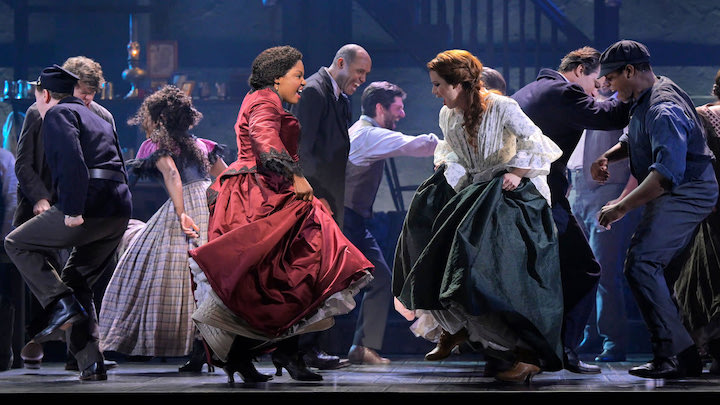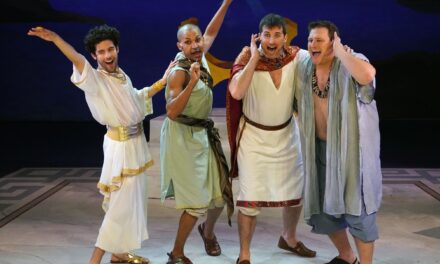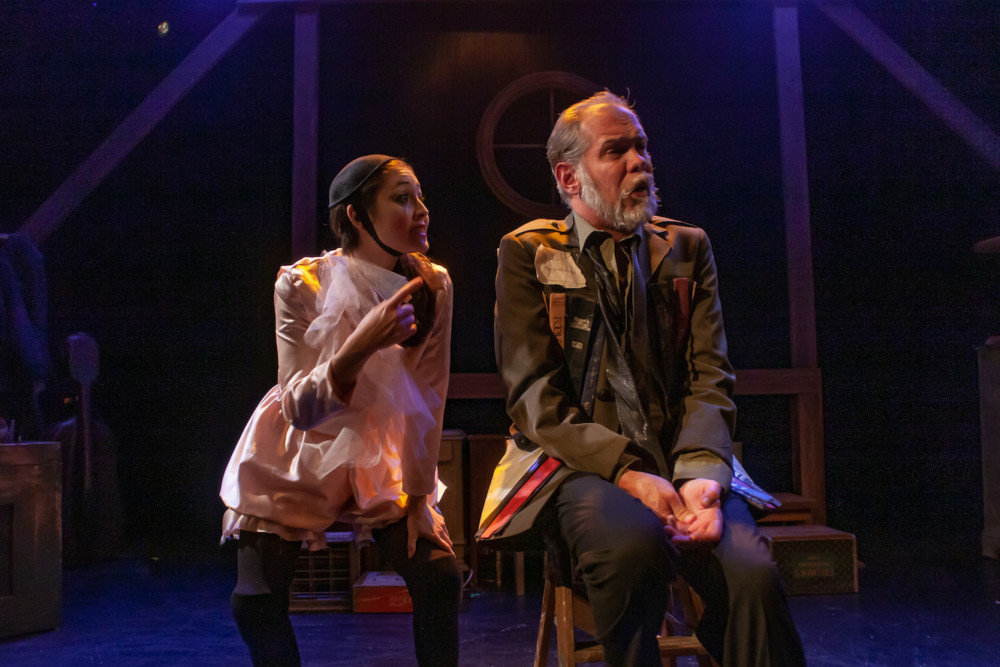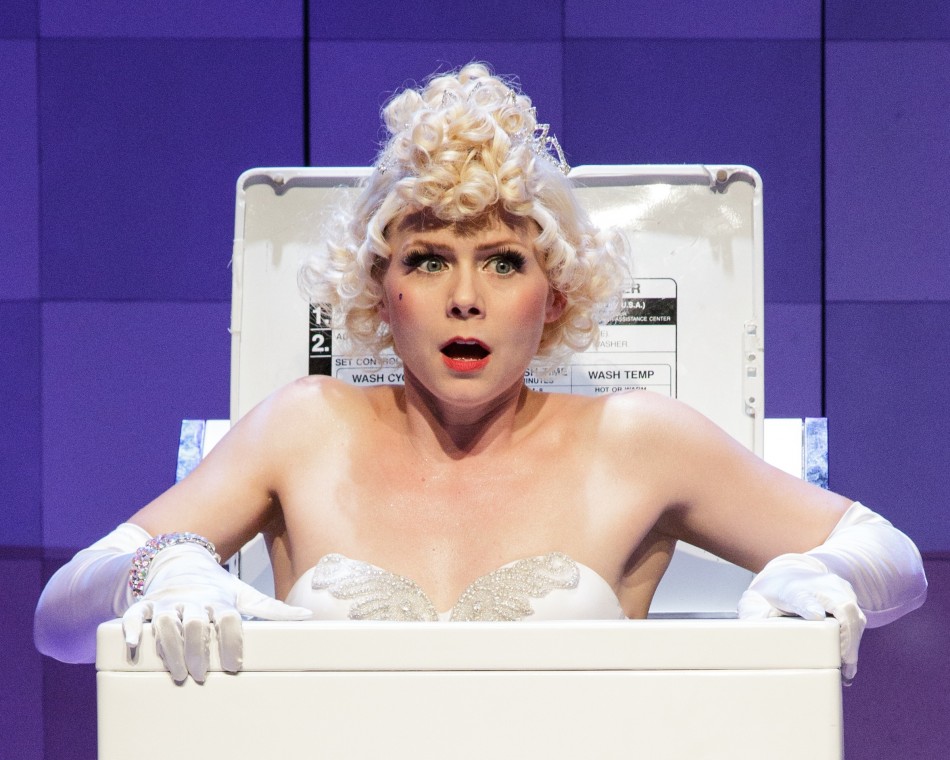By Carol Rocamora. . .
American history as a hot theatre topic?! Apparently, it’s a trend.
The sensational Hamilton, the moving Come From Away, the spirited Suffs – all playing this season – follow a long line of recent musicals that draw richly and successfully from our colorful, complex, controversial past, including Ragtime, 1776, Scottsboro Boys, and Bloody Bloody Andrew Jackson.
And now comes Paradise Square, featuring a hitherto unexamined chapter in America’s history, namely the 1863 race riots in New York City between Blacks and Irish immigrants. It’s a fascinating period, one that has taken ten years and a massive effort on the part of multiple writers, artistic collaborators and producers (including Berkeley Repertory Theatre) to bring to life on Broadway in the form of a supersized sing-through musical. More accurately, it’s a “sing-and-dance-through” musical, since the thrilling choreography by Bill T. Jones is the most electrifying, unifying feature of this ambitious project.
Featuring a mighty cast of twenty and an even larger additional ensemble of dancer/singers, Paradise Square introduces us to a rough triangle in downtown Manhattan called the Five Points in the mid-nineteeth century, where Nelly O’Brien runs a bar (the location is factual, the protagonist and the bar are fictional). Nelly (Black, played by the powerhouse Joaquina Kalukango) is married to Willie O’Brien (Irish, white, played by Matt Bogart), whose sister Annie (Chilina Kennedy) is married to a Black minister (Nathaniel Stampley) . These inter-marriages are a symbol of the coexistence in which Black and Irish- immigrant New Yorkers have been living amicably side by side…that is, until 1863.
The story of their symbiotic relationships and ultimate violent, tragic disruption is at the heart of Paradise Square. Nelly’s bar is peacefully frequented by Blacks and Irish in the neighborhood. It’s a lively place, full of song, dance, and a score of colorful characters. With the arrival of two newcomers, Owen Duignan (A. J. Shively), an Irish immigrant, and Washington (Henry (Sidney DuPont), an Underground Railroad refugee, the bar ignites with excitement, as they show off their talents and are admitted by Nelly as boarders.
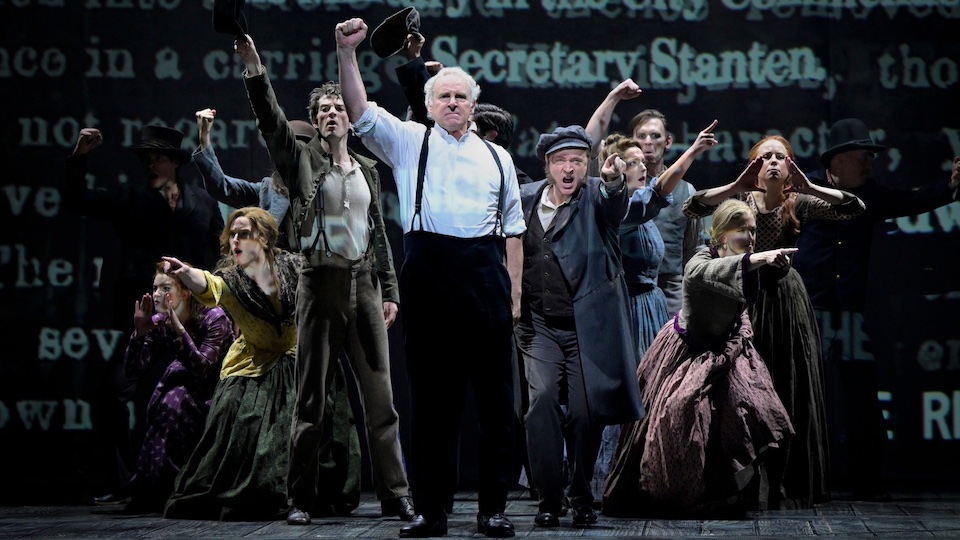
The ambitious trio of authors (Christina Anderson, Craig Lucas and Larry Kirwan) have populated their broad canvas with numerous other colorful characters, to represent various faces of the community. There’s one-armed Mike Quinlan (Kevin Dennis), representing the faction of disgruntled, unemployed Irish workers, and Frederick Tiggens (John Dossett), a powerful (white) politico from uptown Manhattan. There’s also a mysterious pianist at the bar (played by Jacob Fishel) whose compositions are more than faintly reminiscent of Stephen Foster songs (adapted into Jason Howland’s mellifluous score).
Indeed, there are a lot of characters to meet, and a lot happening on this constantly moving stage. There are also some diverting sub-plots – when, for example, we learn that Washington (the runaway Black slave) had murdered his master down south in order to save his beloved, Angelina Baker (Gabrielle McClinton).
But the scene is set for a dramatic event that impacts on everyone, when President Abraham Lincoln announces a mandatory conscription of white males from ages 25-45 to fight in the Civil War (1863)– excluding Blacks, who are not yet considered citizens. Resentment rises in the hitherto friendly community – and ultimately escalates into a devastating race riot incited by Tiggens and his cohorts, as the Irish turn against the Blacks, with a few white hold-outs defending their long-time Black relatives, friends and neighbors, as they stand together in a stirring finale.
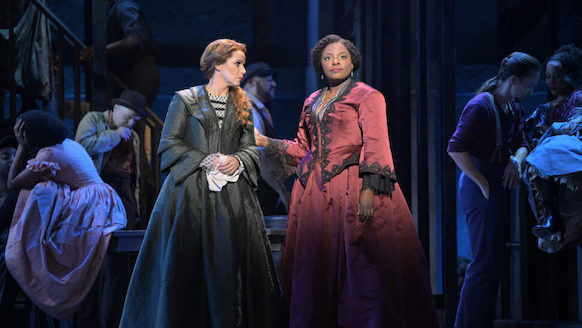

MoisésKaufman (creator of Tectonic’s The Laramie Project) is a director of broad vision, and he navigates his enormous ensemble expertly on Allen Moyer’s impressive set of moving scaffold pieces. The company is continually immersed in song and movement, and the result is a vibrant tableau of a dynamic time in our history.
Center stage in all of this is Joaquina Kalukango, giving a charismatic performance as Nelly O’Brien, the heartbeat of this community. Like Brecht’s Mother Courage, like Lynn Nottage’s Mama Nadi (of Ruined), Kalukango is the centrifugal force that holds the story – and the community – together at its traumatic climax.
While Kalukango provides the production with a majestic, grounded presence, Shively and DuPont lift it up and render it airborne. These two magnificent dancers (playing Owen and Washington) perform Bill T. Jones’s marvelous choreography (including step-dancing and Juba styles) with such energy and exuberance that even after the curtain call, as they exit the stage, they are still dancing.
Paradise Square, book by Christina Anderson, Craig Lucas and Larry Kirwan, music by Jason Howland, lyrics by Nathan Tysen and Masi Asare, directed by Moisés Kaufman, Barrymore Theatre (243 W. 47 St.), run time, 2 hrs. 40 min.
Photos: Kevin Berne


